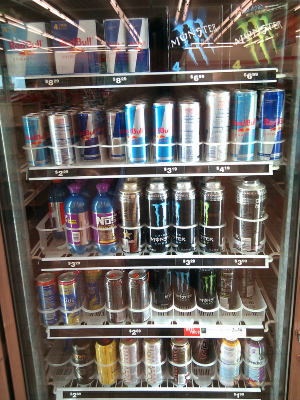
Energy drinks are marketed as beverages that boost energy, enhance performance and improve the immune system. Caffeine is the prominent ingredient in energy drinks, however the Food and Drug Administration (FDA) does not regulate the amount of caffeine present. If the amount of caffeine is listed on the container, it may not be accurate. Other components added to energy drinks include: guarana, sugars, taurine, ginseng and B vitamins. Guarana is a Brazilian cocoa added to energy drinks in the form of guaranine, which is caffeine (1 gram is 40mg of caffeine). Taurine is a natural protein in the body believed to boost the function of the body when added to energy drinks, but this claim has not been proven. Ginseng is marketed to boost the immune system and enhance performance. However, it causes side effects such as headaches, increased heart rate and blood pressure, dizziness, mood changes, and trouble sleeping.
There is no set guideline to recommended caffeine consumption per day but the American Dietetic Association recommends less than 300mg of caffeine per day. The average amount of caffeine in 12 ounces of coffee is 120mg to 180mg. Approximately 50mg of caffeine is in 1 cup of tea. The FDA regulates amount of caffeine in soda with a maximum of 65mg per 12 ounces. The average amount of caffeine per energy drink roughly measures 144-505mg per container.
Caffeine consumption and withdrawal cause similar side effects. These include irritability, anxiety, confusion, nausea, trouble sleeping, tremors, digestive problems, urinary frequency, headache, heart fluttering, irregular heart rate and increased blood pressure.
Mixing energy drinks with alcohol suppresses the perception of the amount of alcohol consumed. Those who consume alcohol with energy drinks exhibit fewer symptoms such as headache, weakness, and impaired muscle coordination. However, impaired motor coordination and visual reaction time are still exhibited.
MacKoul Pediatrics is an amazing local pediatrics office in Cape Coral, FL where caring, compassionate doctors and nurses work with you to keep your children as healthy as possible. MacKoul cares for children from birth to college age, from Cape Coral, Fort Myers, Naples, and beyond.
September 13, 2013
 Energy drinks are marketed as beverages that boost energy, enhance performance and improve the immune system. Caffeine is the prominent ingredient in energy drinks, however the Food and Drug Administration (FDA) does not regulate the amount of caffeine present. If the amount of caffeine is listed on the container, it may not be accurate. Other components added to energy drinks include: guarana, sugars, taurine, ginseng and B vitamins. Guarana is a Brazilian cocoa added to energy drinks in the form of guaranine, which is caffeine (1 gram is 40mg of caffeine). Taurine is a natural protein in the body believed to boost the function of the body when added to energy drinks, but this claim has not been proven. Ginseng is marketed to boost the immune system and enhance performance. However, it causes side effects such as headaches, increased heart rate and blood pressure, dizziness, mood changes, and trouble sleeping.
Energy drinks are marketed as beverages that boost energy, enhance performance and improve the immune system. Caffeine is the prominent ingredient in energy drinks, however the Food and Drug Administration (FDA) does not regulate the amount of caffeine present. If the amount of caffeine is listed on the container, it may not be accurate. Other components added to energy drinks include: guarana, sugars, taurine, ginseng and B vitamins. Guarana is a Brazilian cocoa added to energy drinks in the form of guaranine, which is caffeine (1 gram is 40mg of caffeine). Taurine is a natural protein in the body believed to boost the function of the body when added to energy drinks, but this claim has not been proven. Ginseng is marketed to boost the immune system and enhance performance. However, it causes side effects such as headaches, increased heart rate and blood pressure, dizziness, mood changes, and trouble sleeping.